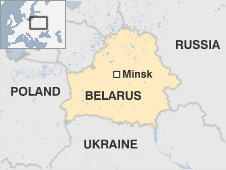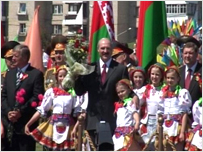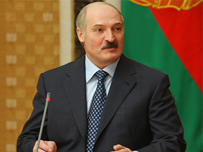Generic Medicines
Taj Pharma is the largest generic pharmaceutical company in India. We hold top positions in different established markets worldwide generics markets..

An indication of the potential in the sector is that gross retail pharmaceutical sales grew 18% year-on-year in 2008 (to US $540 million), while the value of manufacturing production increased by 12% to approximately US $200 million.
The present borders of Belarus were established during the turmoil of World War II.
The former Soviet republic was occupied by the Nazis between 1941 and 
1944 when it lost 2.2 million people including most of its large Jewish population.
There are about 400000 ethnic Poles living in the west of the country.
It has been ruled with an increasingly iron fist since 1994 by President Alexander Lukashenko. Opposition figures are subjected to harsh penalties for organising protests.
In early 2005 Belarus was listed by the US as Europe's only remaining "outpost of tyranny". However since late 2008 there have been signs of a slight easing of tensions with the West.
AT-A-GLANCE
 Politics: President Lukashenko is seen as "Europe's last dictator". He's been in power since 1994
Economy: Soviet-style economy is considered to have been subsidised by cheap Russian gas
International: A key oil and gas pipeline from Russia to Europe runs through Belarus
|
The country became independent in 1991 following the collapse of the Soviet Union.
More than a decade later the sense of national identity is weak international isolation continues and the nature of political links with Russia remains a key issue.
In the Soviet post-war years Belarus became one of the most prosperous parts of the USSR but with independence came economic decline. President Lukashenko has steadfastly opposed the privatisation of state enterprises. Private business is virtually non-existent. Foreign investors stay away.
For much of his career Mr Lukashenko has sought to develop closer ties with Russia. On the political front there was talk of union but little tangible evidence of real progress and certainly not toward the union of equals dreamt of by President Lukashenko.
Belarus remains heavily dependent on Russia to meet its own energy needs and a considerable proportion of Russian oil and gas exports to Europe pass through it.
There was a sharp rise in tension between the two countries at the end of 2006 when Moscow threatened to cut the gas supply until Minsk reluctantly agreed to a deal more than doubling the price.
Relations took a further turn for the worse immediately afterwards when a row over oil exports and related tax rates prompted Russia to cut the supply along the oil export pipeline to Europe. The sides soon reached agreement and the oil flow resumed but not before the row had put Russia's energy muscle back in the spotlight.
President: Alexander Lukashenko
Alexander Lukashenko often referred to as Europe's last dictator was declared to have won a third term as president at elections in March 2006 following a vote which Western observers said was fundamentally flawed.

President Lukashenko takes pride in his authoritarian style
|
They reported widespread harassment of opposition supporters and overwhelming media bias. Official results indicated that Mr Lukashenko had won over 80% of the vote.
The EU and US condemned the election while Russian President Vladimir Putin sent congratulations. The EU also banned the president and a number of
ministers and officials from entering member countries. Mr Lukashenko's assets
in the EU and US are frozen.
A former state farm director Mr Lukashenko was first elected president in
1994 following his energetic performance as chairman of the parliamentary
anti-corruption committee.
A 1996 referendum gave the president greatly increased powers at the expense of parliament and extended his term by two years. He won a further five years in office in 2001 presidential elections condemned as undemocratic by Western observers. Another referendum in October 2004 supported lifting the two-term limit on Mr Lukashenko's rule allowing him to stand again in 2006.
Over the years several opposition politicians who might have provided leadership have disappeared or been imprisoned. Insulting the president even in jest carries a prison sentence.
The president remains defiant in the face of Western pressure for change. He has dismissed all possibility of revolutions such as those which brought an end to old-style regimes in Georgia and neighbouring Ukraine.
The government maintained its stranglehold on politics in the 2008 parliamentary elections winning all seats.
But the release in late 2008 of several opposition activists prompted a slight loosening of EU and US sanctions and tentative talk of a thaw in relations with the West.
He is keen on sport with a particular interest in ice hockey. He was born in 1954.
The Belarussian authorities have been heavily criticised by human rights and media organisations for suppressing freedom of speech muzzling the independent press and denying the opposition access to state-owned media.
Reporters Without Borders (RSF) ranked Belarus 154th out of 173 countries in its 2008 press freedom index.
A media law passed in June-July 2008 raised concerns at home and abroad. New York-based Committee to Protect Journalists (CPJ) condemned the law as "severely restrictive" citing restrictions on foreign funding for the media accreditation rules for journalists and government efforts to "censor the web".
TV is the main source of news. The four national channels are state-controlled; their main competitors for news coverage are Russian TV networks.
Government-controlled newspapers enjoy considerable subsidies and financial privileges while much of the opposition print media has faced increased charges and been forced to change name close down or publish abroad.
But some private publications survive. They include the business daily BDG Delovaya Gazeta and the embattled opposition paper Narodnaya Volya.
Foreign media outlets target Belarus. They include the Polish-funded Belarussian-language satellite TV station Belsat. The channel has yet to attract the mass audience that would make it an influential media source.
The internet is the medium least controlled by the authorities and the web is used by the opposition to make its voice heard. There were around 2.8 million internet users by December 2008 (InternetWorldStats). In 2009 RSF said officials had "drawn information from the Chinese model" in tackling online dissent.
The press
Television
Radio
News agencies/internet
Charter 97 - opposition-leaning site English-language pages

AFRICA | ASIA-PACIFIC | AMERICAS | EUROPE | MIDDLEEAST | SOUTHASIA
![]()
![]()
![]()
Mauritania Mauritius Morocco Mozambique Namibia Niger Nigeria Republic-of-congo Rwanda Sao-tome-and-principe Senegal Seychelles Sierra-leone Somalia South-africa Sudan Swaziland Tanzania The-gambia Togo Tunisia Uganda Australia Brunei Burma Cambodia China East-timor Fiji Indonesia Japan Kazakhstan Kiribati Kyrgyzstan Laos Malaysia Marshall-islands Micronesia Mongolia Nauru New-zealand North-korea Palau Papua-new-guinea Samoa Singapore Solomon-islands South-korea Taiwan Tajikistan Thailand The-philippines Tonga Turkmenistan Tuvalu Uzbekistan Vanuatu Vietnam Antigua-and-barbuda Belize Bolivia Brazil Canada Chile Colombia Costa-rica Cuba Dominica Dominican-republic Ecuador El-salvador Grenada Guatemala Guyana Haiti Honduras Jamaica Mexico Nicaragua St-kitts-and-nevis St-lucia Suriname Trinidad-and-tobago Uruguay Venezuela Albania Andorra Armenia Austria Azerbaijan Belarus Belgium Bosnia-hercegovina Bulgaria Croatia Cyprus Czech-republic Denmark Estonia Finland France Georgia Germany Greece Hungary Iceland Ireland Italy Latvia Liechtenstein Lithuania Luxembourg Macedonia Malta Moldova Monaco Montenegro Norway Poland Portugal Russia San-marino Serbia Slovakia Slovenia Spain Sweden Algeria Egypt Iran Iraq Israel-and-palestinian-territories Jordan Kuwait Lebanon Libya Mauritania Oman Saudi-arabia Sudan Syria Tunisia United-arab-emirates Yemen Afghanistan Bangladesh Bhutan India Nepal Pakistan Sri-Lanka The-Maldive